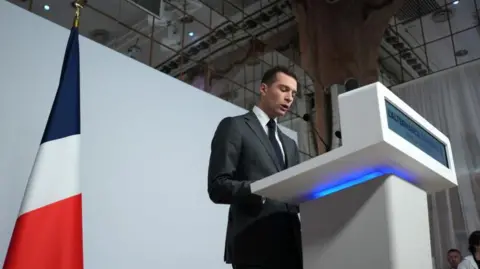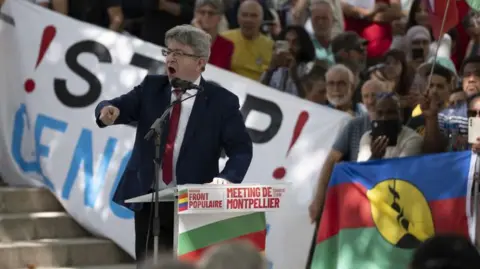By Paul Kirby, Europe Editor
 Nathan Lainé/Bloomberg
Nathan Lainé/BloombergThe leader of France’s far-right National Rally highlighted his party’s plans to tackle the cost of living crisis while targeting immigration and public order, with the promise “we are ready” to govern.
Jordan Bardella, 28, told voters on Sunday before the first round of legislative elections that the National Rally was “the only credible alternative” to meet France’s aspirations.
He hopes to become France’s next prime minister if the National Rally becomes the largest party in the National Assembly, as opinion polls suggest.
In addition to deporting foreign criminals, his party wants to restrict immigration by removing the right to nationality – birthright – for any person residing on French territory for at least five years aged 11 to 18.
Opinion surveys give the National Rally (RN) several points ahead of the New Left Popular Front. President Emmanuel Macron’s centrist party, Renew, comes in third after responding to the RN’s victory in the European elections earlier this month by calling early elections.
The vote will take place in two rounds, on June 30 and July 7.
But polls suggest the National Rally may fall short of an absolute majority of 289 seats in the 577-seat National Assembly.
The three leading groups face off on Tuesday during a televised debate pitting Mr. Bardella against Prime Minister Gabriel Attal and Manuel Bompard of the New Popular Front. Mr. Attal has already ridiculed the RN’s economic projects by calling them disastrous.
President Macron warned in a podcast that the plans of the “two extremes” would lead to a “civil war” – both those of the Rassemblement National and France Insoumise, which forms a large part of the left-wing four-party alliance.
While he said the National Rally sows discord because it reduces people to one religion or ethnicity, the far left is little different because of its focus on “communitarianism.”
Showcasing his nationalist credentials, Mr Bardella said the most sensitive jobs in defense and security would be reserved for French citizens, excluding dual nationals.
The social budget would be reduced as part of a national priority program that would limit social spending to French citizens, he added. This would likely be contrary to the French Constitution, which is why Mr Bardella said that if necessary he would pass it through a referendum.
The Minister of Finance, Bruno Le Maire, said he feared for civil relations: “I consider (the RN) as a factor of disorder and violence.”
Mr Bardella said there would be minimum sentences for repeat offenders, drug trafficking and attacks on public officials, and that any organization using violence would be disbanded, whether “far-right or ultra-left.
He also promised a “big bang” for the education authority with a ban on mobile phones in schools and a trial of school uniforms.
Over the years, Mr. Bardella’s party has been seen as close to Vladimir Putin’s Russia, and he has done everything possible to secure continued support for Ukraine. But he said he had drawn a “red line” over handing over long-range missiles to kyiv or sending French troops, which Mr Macron suggested was possible.
Many RN projects focus on the cost of living crisis in France. President Macron’s unpopular pension reforms would be “repealed in principle” and anyone who has worked for 40 years could retire at 60.
The National Rally’s policies have been widely condemned by political opponents as unaffordable, particularly the pledge to reduce VAT (sales tax) on energy products from 20% to 5.5%, estimated to cost 17 billion euros (£14 billion), according to the French economy. ministry.
He then affirmed that his party was the only republican bulwark against “the extreme left of Jean-Luc Mélenchon”.
 Jeremy Suyker/Bloomberg
Jeremy Suyker/Bloomberg Mr Mélenchon has been accused of downplaying anti-Semitism, calling it this month “residual” in France, despite a surge in attacks in recent months. The issue became part of the election campaign last week when a 12-year-old Jewish girl was raped by boys and subjected to anti-Semitic insults in a Paris suburb.
Other members of the left-wing bloc have been widely criticized for their support for Mr. Mélenchon, who has made no secret of his desire to become prime minister if they win the election.
However, several leaders in the bloc insisted he would not be a candidate, including Greens leader Marine Tondelier, who said a decision would be made by consensus.
The fault lines within the left-wing alliance were exposed by former Socialist President François Hollande, who urged Mr Mélenchon to “shut up” and stop scaring away moderate voters.



